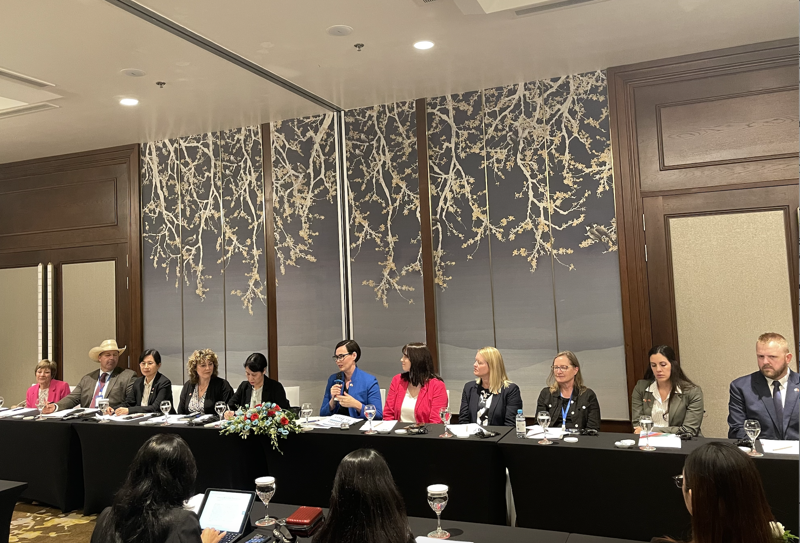A US trade delegation of 100 participants, including 35 business representatives and officials from the Federal Department of Agriculture and the Departments of Agriculture of nine states, and representatives from 21 US Departments of Agriculture's cooperators, is visiting Vietnam to explore cooperation opportunities between the two countries.
This marks the largest-ever agricultural trade mission from the US to Vietnam and is led by Under Secretary for Trade and Foreign Agricultural Affairs Alexis Taylor, in celebration of the first anniversary of the Comprehensive Strategic Partnership between Vietnam and the US.
During a press briefing in Hanoi on September 12, Under Secretary Taylor noted that this is her second visit to Vietnam in two years. The trade mission follows the recent expansion of market access for US peaches and nectarines and coincides with the first anniversary of the US-Vietnam Comprehensive Strategic Partnership when leaders of both countries reaffirmed the importance of economic, trade, and investment cooperation and innovation-driven inclusive economic growth as the core foundations and sources of momentum in the bilateral relationship.
She explained the trade mission's focus on connecting with key importers for business-to-business meetings and learning about local and regional market conditions through site visits and briefings with industry experts and government officials in Hanoi and Ho Chi Minh city.
According to Under Secretary Taylor, markets in Southeast Asia hold immense opportunity for U.S. exporters. Vietnamese consumers are increasingly turning to U.S. products to meet growing demands for food processing, retail, and restaurant sectors, with exceptional presence in tree nut, fresh fruit, poultry, beef, and pork industries.
"Our presence is comprehensive and ambitious in Vietnam, working frequently with the Ministry of Agriculture and Rural Development and other government agencies," Under Secretary Taylor said. "Our teams here work tirelessly to help Vietnam improve its regulatory infrastructure and science-based decision-making processes, advancing efforts on agricultural biotechnology, market access of U.S. products, maximum residue limits, fertilizer use, sustainability, and more."
The Under Secretary affirmed that the large participation of members from 9 US States showed the deep interest of the US Department of Agriculture and US businesses in the Vietnamese market.
"American businesses do not bring products to Vietnam to compete with Vietnamese agricultural products, but the two sides can complement each other," she noted, adding that "There are many types of fruit that Vietnam exports that the US cannot produce and vice versa."
Under Secretary Taylor said that Vietnamese consumers are increasingly interested in US products, such as nuts, fresh fruit, chicken, beef and pork. The US is exporting many types of fresh fruits such as cherries, nectarines, apples, oranges and blueberries to Vietnam. "These products help consumers diversify their diets and choices," she added.
According to the US Department of Agriculture, Vietnam is currently the 10th largest agricultural exporter to the US.
To date, Vietnam has officially exported 8 types of fruit, including grapefruit, mango, dragon fruit, longan, rambutan, lychee, star apple and coconut to the US market.
“We see many new opportunities for US agriculture and food in Vietnam, including fresh fruits, meats and consumer goods," said Ms. Taylor. "With the rise of the middle class in Vietnam, they want more diverse choices."
On the other hand, according to the Vietnamese Ministry of Agriculture and Rural Development (MARD), the US became Vietnam's largest market for agricultural, forestry, and fishery products over the past eight months of 2024.
In the reviewed period, the products brought home about $8.58 billion from the US market. The figure accounted for 21.4 per cent of Vietnam’s total exports in this sector, marking a 23.5 per cent increase compared to the same period last year.
In the meeting with Under Secretary Taylor on September 12, Deputy Minister of Industry and Trade Nguyen Sinh Nhat Tan also affirmed that market access for agricultural products is a top priority for Vietnam and the US with significant progress made.
Mr. Tan said the US has allowed the import of fresh coconuts from Vietnam and is in the final steps of granting similar permission for Vietnamese passion fruits. Meanwhile, Vietnam has opened its market for US grapefruits, peaches, and nectarines. Additionally, the MARD and the US Department of Agriculture are finalising procedures for other products, such as oranges, tangerines, plums, and seedless lemons.
The Deputy Minister affirmed that the US is a key partner of Vietnam and expressed his strong desire to further strengthen trade and investment relations between the two countries.
He emphasised that the elevation of the bilateral relations to a Comprehensive strategic partnership opened up numerous opportunities for cooperation across all fields, including economic and trade sectors.
Vietnam, particularly the Ministry of Industry and Trade (MoIT), will continue to actively cooperate with the US to comprehensively address the concerns of both countries, thereby maintaining stable trade relations and working towards a balanced, sustainable, and mutually beneficial trade ties, the official stressed.









 Google translate
Google translate